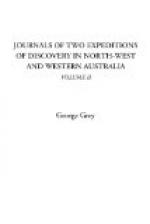The following is a very favourite song of the natives to the north of Perth; it is sung to a wild and plaintive air, and relates to some action of a native who lived in that part of the continent, of the name of Warbunga. A little boy, a descendant of his, is still living, who bears the same name.
SPECIMENS OF SONGS. EXAMPLES OF SONGS FOR VARIOUS OCCASIONS.
Kad-ju bar-dook,
War-bung-a-loo,
War-bung-a-loo.
Kad-ju bar-dook,
War-bung-a-loo,
War-bung-a-loo,
War-bung-a-loo.
They then commence again, constantly repeating these words in the same order.
TRANSLATION.
Thy hatchet is near thee,
Oh Warbunga,
Oh Warbunga.
Thy hatchet is near thee,
Warbunga-ho,
Warbunga-ho,
Warbunga-ho.
A favourite song of the natives in the district of
the Murray in Western
Australia is:
Kar-ro yool, i, yool-a!
Kar-ro yool, i, yool-a!
etc. etc. etc.
And these words they go on singing for an hour together, in the event of the absence of any of their relatives or friends upon a hunting or war excursion.
TRANSLATION.
Return hither, hither ho!
Return hither, hither ho!
The following is a very good specimen of one of their comic songs. It is often sung by the natives in the vicinity of King George’s Sound.
Mat-ta, mat-ta,
Yungore bya,
Mat-ta, mat-ta,
Yungore bya,
etc. etc. etc.
TRANSLATION.
Oh what legs, oh what legs,
The Kangaroo-rumped fellows,
Oh what legs, oh what legs,
etc. etc. etc.
FUNERAL CHANT.
Nothing can awake in the breast more melancholy feelings than the funeral chants of these people. They are sung by a whole chorus of females of all ages and the effect produced upon the bystanders by this wild music is indescribable. I will give one chant which I have heard sung upon several occasions.
The young women sing: Kar-dang.
The old women sing: Mam-mul.
Together: gar-ro.
Me-la nad-jo
Nung-a-broo.
Kar-dang.
Mam-mul.
Together: gar-ro.
Me-la nad-jo
Nung-a-broo.
etc. etc. etc.
TRANSLATION.
My young brother
My young son
(again)
In future shall I
never see.
My young brother
My young son
(again)
In future shall I
never see.
WAR-CHANTS. INFLUENCE OF SONGS IN ROUSING THE ANGRY PASSIONS OF THE MEN.
In this chant the old and young women respectively sing “my young son,” and, “my young brother:” the metre and rhyme are also very carefully preserved, and the word Kardang is evidently expressly selected for this purpose; for were they speaking in prose they would use a term denoting eldest brother, youngest brother, second brother, or some similar one; whilst I have heard the word Kardang always used in this chant whether the deceased was the first, second, or third brother.




